
Anytime I'm headed to the beach, pool, or anywhere my skin may be exposed to sunlight for a long period of time, I always make sure to put on sunblock [1] before walking out the door. While I know there are benefits to getting some sun — namely, that sunlight triggers the body to produce vitamin D [2], which is essential to overall health — I try not to take any chances with those damageing UV rays. But can the same sunscreen that helps protect your skin cause you to have lower levels of vitamin D [3]?
To put it simply, yes, sunscreen can physically block your skin from absorbing sunlight, which can hinder the production of vitamin D. However, Tiffany Libby [4], MD, a board-certified dermatologist and Mohs surgeon at Brown Dermatology in Rhode Island, explained that most people don't apply the necessary amount of sunblock for this to happen.
If you're applying sunscreen effectively — meaning, you're using the equivalent of a shot glass of sunscreen every time, and reapplying every two hours [5] — and also practicing other good habits, like wearing sun-protective clothing, "then yes, it would block out the sun's rays, which stimulate the skin to make vitamin D," Dr. Libby told POPSUGAR. Unfortunately, this is rarely the case. How many times have you forgotten to reapply after a dip in the pool? (Guilty.)
Even when applied diligently, sunscreen also doesn't filter out all UVB rays. "An SPF 15 sunscreen filters out 93 percent and SPF 50 filters out 98 percent," Alyx Rosen Aigen [7], MD, a board-certified dermatologist and assistant professor of dermatology at the University of Miami, told POPSUGAR. "Therefore, anywhere from two to seven percent of UVB from the sun reaches your skin with sunscreen application." Theoretically, this means your skin will still absorb some sunlight, and as a result, begin producing vitamin D.
The kind of sunscreen you use matters, too. Dr. Rosen Aigen explained that you'll probably apply less than a shot glass-sized amount if you're using a sunscreen spray, because "you cannot accurately judge how much is being applied," due to its visibility and other contributing factors such as wind, which can carry the sunscreen away from the body. If you prefer spray over lotion, Dr. Libby recommends spraying each area for up to six seconds in order to achieve optimal SPF protection.
While a lower SPF or a spray formula may let in more UVB rays — triggering the production of vitamin D — they can also put you at risk for sun damage, which can contribute to ageing and the development of skin cancer. So, be smart about applying the correct amount of sunscreen, and set a reminder to reapply. If you're concerned that you're not getting enough vitamin D [8], both experts recommend reaching out to your doctor, who can order a blood test and determine whether you need a supplement [9].
